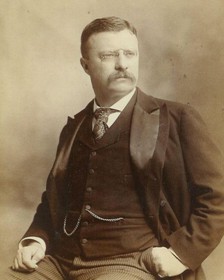 As soon as President Obama invoked Theodore Roosevelt’s name last night, we started digging through the archives in search of details about the Bull Moose’s call for health-care reform. It was a tougher get than we expected, as the proposal amounts to little more than a single line in the Progressive Party’s final 1912 platform; it was evidently a late add, as the language doesn’t appear in the August version (PDF). Roosevelt’s call-by-proxy basically goes as so:
As soon as President Obama invoked Theodore Roosevelt’s name last night, we started digging through the archives in search of details about the Bull Moose’s call for health-care reform. It was a tougher get than we expected, as the proposal amounts to little more than a single line in the Progressive Party’s final 1912 platform; it was evidently a late add, as the language doesn’t appear in the August version (PDF). Roosevelt’s call-by-proxy basically goes as so:
The supreme duty of the Nation is the conservation of human resources through an enlightened measure of social and industrial justice. We pledge ourselves to work unceasingly in State and Nation for…the protection of home life against the hazards of sickness, irregular employment and old age through the adoption of a system of social insurance adapted to American use.
In other words, as the PolitiFact crew noted a while back, the Progressives were basically calling for a version of Social Security plus health care. At least TR’s spirit can look down from the cosmos and know that the former came to fruition.
But once we found that health-care nugget, we couldn’t help but give the entire party platform a read. What a fascinating peek into the issues that mattered to left-of-center folks back in the day—the language gives us an excellent sense of just how hard life must’ve been for those on the bottom rung of the economy. Check out this plea for:
The abolition of the convict contract labor system; substituting a system of prison production for governmental consumption only; and the application of prisoners’ earnings to the support of their dependent families.
We never really understood how big of an issue this was until we unearthed this disturbing article on the history of 19th-century penal labor. This stat sorta blew our minds:
In 1885, some 67 percent of working prisoners were employed in the private sector.
In other words, America’s evolution into the world’s business leader was greatly aided by the incarcerated. And that revelation really makes us curious to read Slavery by Another Name.
UPDATE A great post on this very topic here, via Microkhan ally Oliver Tatom.


Oliver // Sep 10, 2009 at 11:49 am
Great minds think alike, I guess:
http://olivertatom.blogspot.com/2009/09/we-stand-at-armageddon.html
Brendan I. Koerner // Sep 10, 2009 at 11:53 am
@Oliver: Great post–more thoughtful than mine, and great get on digging up the TR speech nugget.
Any sense of what happened btw. August and November so that the social insurance idea was added? Was that TR’s personal handiwork, perhaps, or did it come from another Progressive Party bigwig?
Felipe // Sep 10, 2009 at 1:28 pm
Scoot Reynolds Nelson does a great job illuminating convict labor in his book on John Henry. Really grim stuff in a really enjoyable read.
I keep waiting for someone “respectable” to start making a serious argument for revival on convict labor- I can feel it coming . . .
Brendan I. Koerner // Sep 10, 2009 at 2:09 pm
@Felipe: Thanks for the book rec.
I’ll keep an eye peeled on the Investor Business Daily op-ed page. That strikes me as the likeliest platform for someone to suggest reversing T. Roosevelt’s dream.
Jordan // Sep 11, 2009 at 2:17 pm
@Brendan
Apparently a lot of the opposition in the U.S. comes from the unions. It’s not too surprising that they would oppose the creation of a vast new pool of unskilled labor pushing down marginal wages. Though it sounds like some of it happens anyway.
http://www.hartford-hwp.com/archives/45b/index-nd.html
Jerome // Sep 12, 2009 at 6:40 pm
This is a great observation (regarding the book ‘Slavery By Another Name’). I happened across this book one time when I was in Barnes & Nobles. I sat down and read excerpts from different chapters and just about threw up everything that I had eaten that day. This book highlighted some of the most despicable and evil stuff ever perpetrated on supposedly “Free Men” within the United States. I am a black man in his late thirties and every time that I find life hard or difficult, I just lean on the knowledge that I live a life of near bliss compared to the psychic terror that my forefathers had to endure. I do not suffer from ‘Angry Black Man’ syndrome but sometimes I wonder how a people could survive such terrorism and still be somewhat in tact.
Brendan I. Koerner // Sep 13, 2009 at 10:56 am
@Jerome: Thanks a mil for the thoughtful comment. I actually plan on a) reading “Slavery by Another Name” and b) doing some more posts on American convict labor, so please keep an eye peeled.
As Jordan notes above, it’s interesting to note that TR’s opposition to the practice was fueled by union demands rather than genuine concern for justice. And that has me thinking about other instances in which political pragmatism and moral righteousness have actually dovetailed perfectly. Anyone?
Inadvertently on the Angels’ Side // Sep 15, 2009 at 11:24 am
[…] post about Teddy Roosevelt’s health-care reform attracted a fair number of responses, in […]